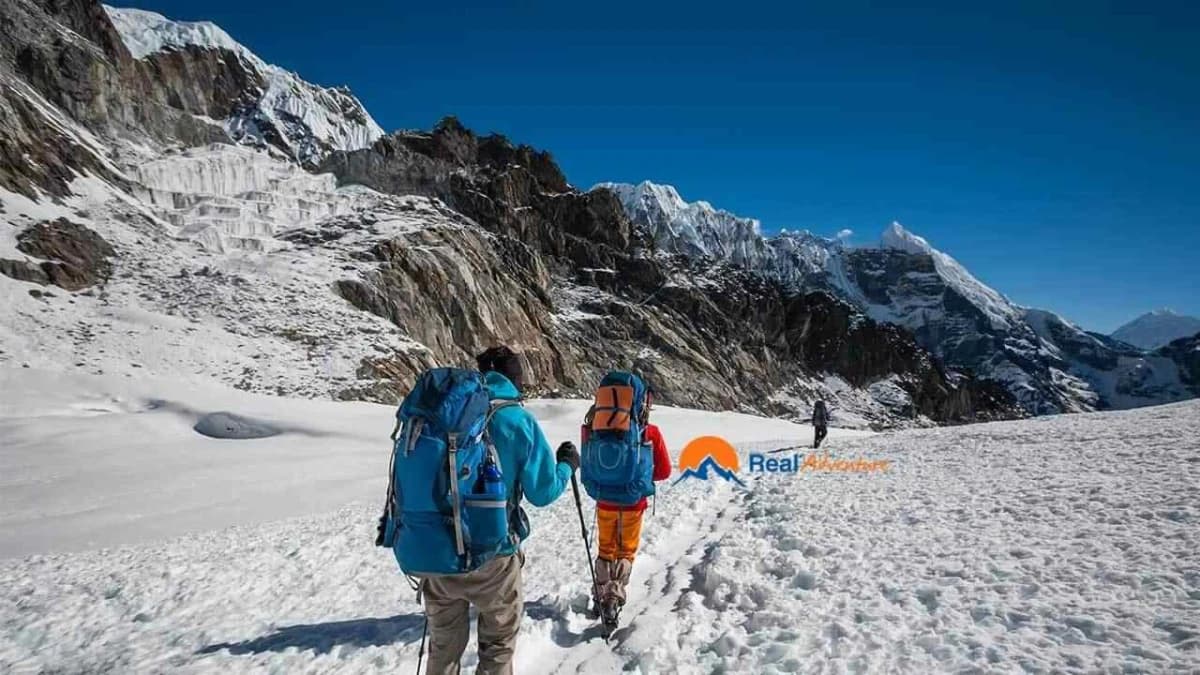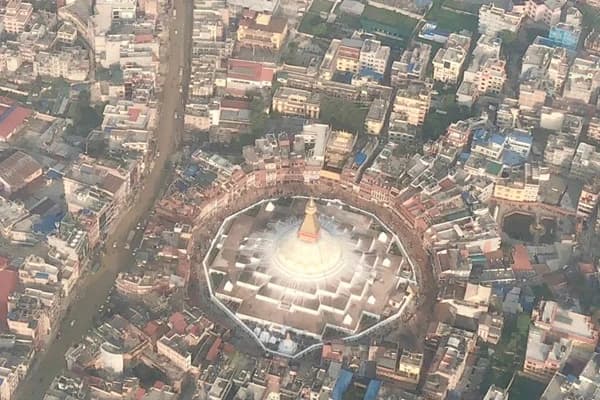EBC is an exciting trek, but it also involves a lot of challenges. Despite the difficulties, Everest Base Camp’s popularity continues to grow among trekkers worldwide. High altitude means lesser oxygen levels, and if you are unprepared, then there is a high chance you may be affected by altitude sickness. The terrain is rugged and includes rocky trails, steep inclines, and sudden weather changes that keep you on your toes. Long days of hiking push one's physical capacity to the limit. Strength training and cardio workouts are crucial, just like preparing your mind is: staying motivated on those tough days makes all the difference.
For beginners, the common question is how fit one needs to be for the trek. The answer lies in a balanced preparation and understanding of the Everest Base Camp Trek itinerary. Knowledge of the daily schedule and difficulties can help you assess the journey's demands and work towards developing the right mindset.
The Altitude Factor
The altitude is the biggest challenge when learning to train for the EBC trek. In your journey up toward the Everest Region, the oxygen levels become extremely low, thus putting a significant strain on the body. This may even result in altitude sickness, a common issue with most trekkers. Training the lungs and the body with specific breathing exercises is essential to an Everest Base Camp training program to ensure your readiness for the high-altitude environment.
Terrain and Weather
The pathway to EBC is varied and dramatic. You often battle unstable weather conditions, From crossing rock trails and suspension bridges to walking over snowy trails. From bright, sun-kissed mornings to sudden snowfalls, the terrain keeps you going. Understanding the dynamics of what you will encounter and preparing for these shifts is one of the most essential EBC trek tips for a smooth journey.
Physical Endurance
The trek involves 5-8 hours of walking daily, sometimes on steep inclines. Regarding how fit you need to be for EBC, endurance is the answer. Your preparation should necessarily include strength training and cardio exercises. Such stamina-building through long-distance walks will make the physically demanding days of the trek a lot easier.
Mental Stamina
As much as physical fitness is essential, so is mental resilience to the task ahead. Mental fatigue from days of hiking, in addition to unpredictable conditions, is a challenge. Visualize your progress, stay connected with the breathtaking journey, and remember the ultimate goal at the end of this adventure. For beginners at Everest Base Camp, it's all about determination and realistic expectations in balance.
Building Physical Strength and Endurance

Cardiovascular Training
The centerpiece of any Everest Base Camp training program will be some form of cardio training. High-altitude trekking will immediately make your heart and lungs work harder due to lower oxygen levels. You can get this type of exercise through running, cycling, swimming, or climbing stairs. Keep your cardiovascular fitness steady with a lot of steady-state cardio, but also add in some interval training to build lung capacity for the trek ahead.
Strength Workouts
- Squats
- Lunges
- Step-ups
- Deadlifts
- Calf raises
- Bulgarian split squats
- Leg press
- Glute bridges
- Push-ups
- Bent-over rows
Core Exercises
- Planks
- Russian twists
- Bird dogs
- Leg raises
- Mountain climbers
- Bicycle crunches
- Side planks
- Dead bugs
- Flutter kicks
- V-ups
Endurance Hacks
- Start with shorter hikes and gradually increase the distance each week
- Carry a backpack with weight to simulate the load you’ll carry during the trek
- Focus on consistent, steady-paced walking to build stamina
- Try long walks on different terrains, such as trails, hills, and uneven surfaces
- Take shorter, regular breaks to build endurance and practice pacing yourself
- Include uphill and downhill training to prepare for various elevation changes on the EBC trail.
- Walk with proper footwear to avoid blisters and discomfort on the trail.
- Hydrate regularly and practice fueling your body with snacks during long walks.
- Cross-train with cycling, swimming, or rowing to improve overall endurance.
- Time your hikes and note improvements in distance and speed.
Preparing for the High Altitude
Acclimatization
Acclimatization is necessary when trekking to EBC for protection against altitude sickness and EBC’s coldness. It means going up gradually but allowing your body time to acclimate to the thin air. During your trek, spend extra time at intermediate elevations before advancing to high altitudes. Rest days are critical in helping the body adapt and reducing the risk of altitude-related severe problems. To get your body accustomed to high-altitude conditions, practice hiking at increasing elevations before the trek as part of your Everest base camp training program.
Breathing Exercises
- Diaphragmatic Breathing (Abdominal Breathing)
- Box Breathing
- Nadi Shodhana (Alternate Nostril Breathing)
- Pursed Lip Breathing
- 4-7-8 Breathing
- Kapalbhati (Skull Shining Breath)
- Lion’s Breath
- Deep Belly Breathing
- Sitali Pranayama (Cooling Breath)
Recognizing Altitude Sickness: What to Do If It Hits
- Symptoms to watch for: Headache, nausea, dizziness, fatigue, shortness of breath, loss of appetite, and sleeplessness.
- Immediate action: Stop ascending and take a rest. Give your body time to acclimatize at the present elevation.
- Hydrate: Consume plenty of water, but avoid all alcohol and caffeine, as they can dehydrate you.
- Eat light: Keep with light, easily digestible food and snacks to maintain energy.
- Monitor the progress: If symptoms do not improve after several hours, descend to lower levels.
- Avoid going higher: When one still feels ill, continuing higher during trekking should not be done.
- Seek help: If symptoms worsen or severe dizziness or shortness of breath persists, immediate medical attention should be sought.
- Prevention: Gradual ascension and having rest days are the ways to prevent altitude sickness.
Practical Tips to Get Trek-Ready
Choosing the Right Gear: What You Need
- Trekking Boots
- Backpack
- Sleeping Bag
- Trekking Poles
- Clothing (Moisture-wicking base layers, insulating mid-layers, waterproof outer layers)
- Headlamp
- Socks (Moisture-wicking)
- Water Bottle/Bladder
- First Aid Kit
- Sunglasses
- Gloves & Hat
- Gaiters
- Portable Charger
- Water Purification Tablets
- Snacks
- Camera
- Multi-tool
For More Information: Everest Base Camp Trek Packing List
Setting a Training Schedule: A Weekly Breakdown
A well-structured training schedule is quite essential in preparing for the trek. Early in your preparation, begin with cardio exercises and strength training. Here's a sample breakdown of how a week can look:
- Monday: Rest day or light stretching
- Tuesday: Cardio, such as running, cycling, or swimming
- Wednesday: Strength training, including legs, back, arms
- Thursday: Hiking or long walk with a loaded backpack
- Friday: Core exercises and flexibility training
- Saturday: Weekend hike or elevation training
- Sunday: Rest day or active recovery (light yoga or walking)
This schedule helps build a balanced mix of endurance, strength, and flexibility, ensuring you’re ready for the trek's physical and mental demands.
Mental Preparation for the EBC Trek
- Realize the Everest Base Camp difficulties ahead of you, and set realistic goals.
- Emphasize positive thinking and maintaining good attitudes, which are vital, especially at critical junctures.
- Mentally prepare yourself to be strong and unwavering within moments that bring exhaustion.
- Accept the slowness of the trek and be patient as you move, mainly because of the altitude.
- Imagine successfully reaching EBC and attaching a motivational stake to it.
- Enjoy all parts of the adventure: reframe the challenges as an opportunity to learn rather than defeat.
- Get ready for times of loneliness and silence on the extended day walks.
- Being present is part of being grounded and centered; it prepares your mind and emotions for less stress during the expedition.
- Be adaptable to changes in the weather or with your body that may occur and affect your goals.
- Learn to calm down and remain cool under pressure when circumstances get wrong.
Nutrition and Recovery
Eating for Energy
- Whole grains (oats, quinoa, brown rice)
- Sweet potatoes
- Avocados
- Nuts and seeds
- Olive oil
- Fruits (bananas, apples, berries)
- Vegetables (leafy greens, broccoli, carrots)
- Lean proteins (chicken, fish, tofu, beans)
- Eggs
- Energy bars
- Trail mix
- Dried fruit
The Role of Protein
- Consume protein within 30 minutes post-workout to aid in muscle repair and recovery.
- Protein-rich foods like chicken, fish, eggs, beans, and tofu to rebuild muscle tissue.
- Pair protein with complex carbohydrates, such as sweet potatoes or whole grains, for recovery.
- Protein shakes are convenient to guarantee your intake of the protein requirement after training.
- Regular protein intake avoids muscle breakdown and develops muscles over a certain period.
Rest and Recovery
- Sleep: Get 7-9 hours to give your muscles time to recover and rebuild.
- Active Recovery: Light yoga, stretching, and walking can help reduce muscle tightness.
- Rest Days: Take rest days throughout your training to avoid overtraining and minimize the occurrence of possible injuries.
- Foam Rolling: A foam roller helps loosen tight muscles after strenuous workouts and keeps blood flowing.
Hydration Strategies
- Hydrate Constantly: Drink at least 2-3 liters daily, but drink more when training at higher altitudes.
- Electrolytes: Including an electrolyte drink helps maintain sodium, potassium, and magnesium levels.
- Pre-Hydrate: Before working out, a little water intake prepares your body.
- Hydrate During and After: Take hydration along during workouts and replenish afterward.
- Checking on Hydration: Check the color of your urine; light yellow is perfect.
Final Preparations Before You Leave
- Check that all your equipment is packed and ready, from trekking boots to backpacks and sleeping bags.
- Reconfirm all travel arrangements regarding flights, transportation, and accommodation regarding the trek.
- Do a health check with your doctor and ensure all required vaccinations have been taken.
- Bring appropriate medication to prevent altitude sickness.
- Bring enough cash in the local currency and keep cards safe in emergencies.
- Share your itinerary and emergency contacts with friends or family for safety.
- Pack snacks like trail mix and granola bars for quick energy during the trek.
- Review your trekking itinerary to familiarize yourself with the route and schedule.
- Ensure you're well-rested and sleep well in the days before you leave.
- Mentally prepare for the physical and mental challenges that lie ahead.
Recommended Read:
7 Best Treks in the Everest Region
Final Thoughts
While preparing for the adventure of a lifetime, the EBC trek comes with challenges and rewards that will stay in one's memory forever. Whether looking for Everest Base Camp trek cost or wondering if Everest Base Camp is the right fit for beginners, Real Adventure ensures you gain all the knowledge and support to make the journey hassle-free and unforgettable. The trek isn't about arriving at a place; it's much more about the transition in which you transit. Enjoy your trip, prepare yourself, and have fun in each step of your Real Adventure.
Explore our Everest Region Packages
FAQs
How fit do you need to be for Everest Base Camp?
You must at least be generally fit with regular cardiovascular and muscular training. Work on your stamina through hiking, running, and leg exercises in preparation for long days over various trails. Success largely depends on walking for hours in comfort at a steady pace.
What is the best time to trek to Everest Base Camp?
The best times for the trek to EBC are March to May and September to November each year. During these months, the weather is most settled, temperatures are moderate, and visibility is at its best, making the trek relatively safer and more pleasant.
How long does completing the EBC trek take?
The trek usually takes 12 to 14 days, including acclimatization days at higher elevations, to help your body adjust to the altitude. It's important to pace yourself to avoid altitude sickness and fully enjoy the experience.
Recommended Read: EBC Trek Distance and Elevation
What should I pack for the EBC trek?
Pack light yet warm clothing, waterproof equipment, a high-quality backpack, trekking shoes, a sleeping bag, and essential accessories like sunscreen, shades, and a first-aid kit. Remember that all the equipment should be strong enough to sustain cold and high-altitude conditions.
Is altitude sickness a concern during the EBC trek?
The height at which this trek is performed provides the risk of altitude sickness. However, with proper acclimatization and rest days on the way, the risk diminishes. One can drink plenty of water, stroll, and try to note any symptoms, reporting them to the guide to avoid serious health problems.






-(5).webp&w=1200&q=75&dpl=dpl_CtNAyRzUAwPdWKDCFxYk5p2VryPh)